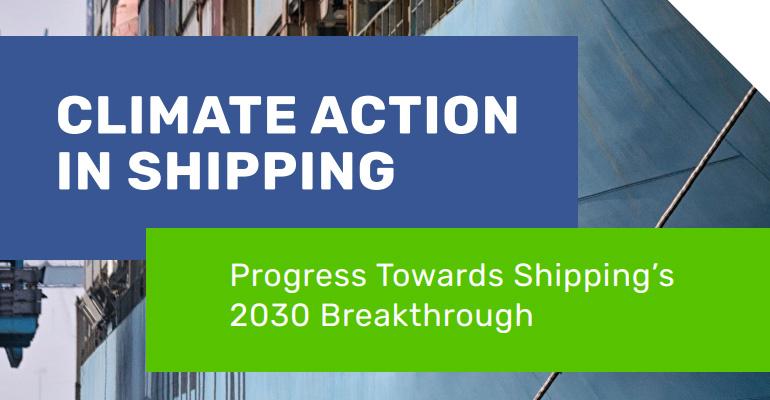A new report by UMAS, the Getting to Zero Coalition, and Race to Zero, calls on industry and governments to take concerted and immediate steps to stimulate supply and demand of scalable zero-emission fuels if shipping is to meet the IMO’s 2030 goal of 5% of renewable fuels by 2030. The window of opportunity will close soon and rapid action is required, the ‘Climate Action in Shipping, Progress towards Shipping’s 2030 Breakthrough report warned.
Although the IMO’s upgraded target on the adoption of fuel emissions reduction is welcome, initiatives to achieve the goal will take time. Global measures to achieve the goals will be adopted in 2025 but will not be implemented until after 2027, the report pointed out. That is why the IMO’s aims must be supported at a national and industry level, it said.
The research team identified issues in both supply and demand. On a low-key estimate, zero-emission fuel production currently in the pipeline could end up covering just a quarter of that required to meet the target. In a more optimistic scenario, zero-emission fuel production could be up to twice as much as is needed.
However, in analysis of possible demand from shipping, the report said that despite “headline grabbing orders for methanol-fuelled ships, continuing the current trajectory of orders might only deliver one fifth of the needed vessels to achieve the breakthrough target”. Progress on policy is critical to enabling the necessary scale-up of supply and demand, it noted.
Jesse Fahnestock, project director at the Global Maritime Forum, a multi-stakeholder body aiming to raise the sustainability of international shipping, said more action is needed. “With the revision of the IMO’s greenhouse gas strategy, the industry’s direction of travel is clear. Especially in these early years, we need to be able to assess how fast we’re moving in that direction. This report shows that the industry is progressing, but that action still needs to accelerate.”
Lead author of the report, Domogoj Baresic, a Research Associate at University College London and a consultant at UMAS, commented: “The last 12 months have seen a positive shift in maritime decarbonisation efforts. Now is the time to see strong progress in terms of commitment for zero-carbon fuels and freight from the industry so that the needed rapid scale-up of these fuels in the energy mix is achieved.”
The UN’s Climate Change High-Level Champion, Dr Mahmoud Mohieldin, said: “Now that we know the international direction of travel for the maritime sector, the 175 member states [of the IMO] need to create incentives for businesses and investors to implement zero-emission ships and freight services.”
Although there had been progress towards the IMO’s 2030 goal of 5% zero-emission fuels by 2030, policymakers should create incentives for scaling up such fuels, he said, citing green hydrogen.
“The alignment of advances in technological innovation, supportive policies, and collaboration across the value chain … will be key for successfully moving towards a healthier, more resilient, zero-carbon world,” he concluded.
Copyright © 2024. All rights reserved. Seatrade, a trading name of Informa Markets (UK) Limited.
Add Seatrade Maritime News to your Google News feed.  |

